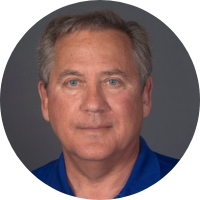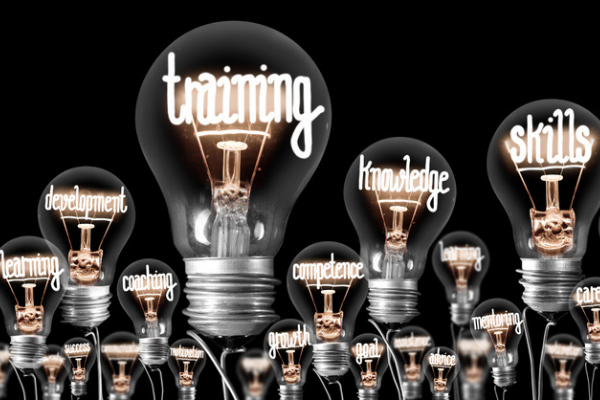
You have had three full careers: 24 years in the Air Force, 9 years as President & CEO of the Asphalt Institute, and 19 years as Executive Director of the ACS Rubber Division. What advice do you have for chemists who might be mulling a career change?
Start the thought process well in advance, do your homework, list your reasons, as well as pros and cons, and talk it through with someone you respect and trust. My wife and I were both career Air Force officers. We began discussing the possible change one year before we made the decision and considered the reasons, as well as all pros and cons.
This was a big decision for us because if I were to try for the Asphalt Institute position, it would mean her resigning her active duty status and completing her last 10 years as a reserve officer and not receiving her retirement pay until she turned 60. We did the homework on salaries, differences between the Air Force and civilian jobs, career impact for both of us, future options, reasons and the pros and cons. We hold a very high respect for each other, so it took months of back and forth to make the decision.
We did the same when we decided I would try for the Executive Director position at the ACS Rubber Division. So, my last advice is once you know what you really want and know it is the right decision, then go for it and don’t look back. You will be amazed at what you can do if you stay positive, confident and are prepared.
What’s the one thing you have learned during your three careers that you would have most benefitted from knowing when you were 20 years old?
Opportunities are always there, but they do not wait. Be ready! Start preparing early in your career and keep a record of your work, accomplishments, awards and anything special you did that stands out showing your character and expertise. When the opportunity comes, you will be ready for it. Forget the old cliché they taught us in the military that said, “Never Volunteer.” This is wrong. Volunteer, take on jobs outside of your normal job, get additional education and learn from everything you do in life.
There are always going to be ups and downs whether you stay in the same job your entire life or decide to make a career change. Don’t let the downs define you. I saw too many friends and colleagues do this and get bitter. Those who stayed positive went on to even better opportunities in their current or new careers. The others did not.
How did your parents influence your leadership style?
My parents were the most important influence in my life and leadership style. My father served in WWII and then completed 30 years in the Army National Guard while becoming a civilian trucker. He and my mother raised 11 of us. The biggest thing he taught me was organization. I carried this all my life, knowing that system analysis and well-organized thought result in the best work and decisions I could make.
My mother gave up her job to raise us. She taught me the other side of the equation…compassion for people. I also carried this all my life, especially when it comes to employees. My style is simple. Treat them with respect and understand we all have families and personal needs, as well as the job. Let them know that their family comes first. Do this and they will give you the loyalty and dedicated work needed to get the job done, whatever it takes.
What was the biggest challenge confronting the ACS Rubber Division when you assumed the Executive Director role nearly 20 years ago? And what is the biggest challenge confronting the division today?
I was the first Executive Director the ACS Rubber Division ever had and hired a professional staff, so the biggest initial challenge was to build confidence between the board and us as we put all the logistics in place that comes with this. Aside from this, the Division had financial difficulties, loss of attendance at our events and had not added new services or programs in years. The result was obvious, loss of members. Also, the relationship with ACS had diminished over the years.
We changed all of that as we first looked at who we were and who we wanted to be, did our first comprehensive strategic plan, added new services and value for being a member and began drawing closer to ACS. One of the best actions we took was for our Chair, Chair-Elect and the Executive Director to visit ACS headquarters each summer to meet with key staff and the ACS CEO, discussing mutual activities and questions from both of us. We have continued this for the past 19 years and the relationship is excellent. We are also financially solvent, our events and membership continue to grow, and we recently purchased our own building, including a new Elastomer Training Center smart classroom.
The second question takes a little more thinking. The biggest challenge facing the Division today is in selecting the new Executive Director, as I will be retiring in a few months.
However, the other challenge is more closely associated with the industry. It continues to evolve, consolidate and many are retiring. The Division is working to build new programs and expand our services again, like our new Young Professionals Group and Women’s Workshop.
We are also adding new outreach programs for K-12 and college students, including expanding our Student Chapters to multiple university chapters in other countries. We have reached out to new industries and non-U.S. organizations related to the elastomer community and are bringing in new members, attendees and exhibitors to our events. On a last note, I am positive the next Executive Director will continue this evolution and have the support of our board and staff.
You have spent time with countless Rubber Division volunteers. When you think about the most effective volunteers you have engaged with, what traits did all of them share?
Passion and commitment! This is evident in their own jobs, as well as in their volunteering and service on our committees and board. This can also be seen in how much they are involved in our Subdivisions that we call Rubber Groups. On the character level, they are all personable, as well as professional and understand the difference in working with the non-profit ACS Rubber Division versus their own job.
We have a statement in every committee charter that states, “The duty of loyalty requires all members of the committee to exercise their powers in the interest of the Division and not in their own interest or the interest of another entity or person.” Those volunteers who understand and follow this have proven to be the most effective.
What are the most important lessons you have learned about leadership during your time with the Asphalt Institute and the Rubber Division?
The basic leadership traits I carried over from the Air Force remained the same, however, it was a different world in the civilian sector. Not everyone had the same commitment and passion. Everyone had different needs this time, including the Board of Directors. Working with a new Chair every year was also different. I had to adapt to the idea that building relationships at all levels and often giving reasons for my decisions was paramount and would make me a better leader. It was no longer do this because I said so.
The biggest challenge though was getting used to people showing up late for a meeting. In the service, everyone was there the exact minute the meeting was started. I am not sure I have quite gotten used to any meeting tardiness even yet!
I learned that leadership today still involves compassion and decision-making, but it also involves discussions when needed, more listening, understanding and the willingness to stand by your decision when the talking is done or be willing to make a change if someone offers a better recommendation.
Developing and maintaining effective relationships seems to have been critical to your career success. Do you think early career chemists adequately understand the benefits of cultivating these relationships?
I suspect some do, but I am not convinced that all understand this. The best ways to learn and understand are to watch others who have been successful in their careers and if possible, find a mentor. I don’t believe that this is taught in schools. It can be learned by becoming involved in outside activities like those that ACS and the Divisions offer, as well as speaking to your peers and other colleagues who have been successful in building relationships to promote their work or sell a new initiative or coalition.
Two key things to remember during their early careers and carry forward are that you can do much more through relationships than what you can do alone and never burn a bridge. People make mistakes, even those you disagree with. Don’t lose a relationship that could still prove beneficial in the future.
Lots of people - particularly early in their careers - say they want to manage people. What do they need to know about managing others?
Most of this can be seen in my previous responses; however, there are some additional things to consider. Read books about management, offering both styles and success stories. Attend seminars and webinars on management.
Recognize that managing people is not the same as supervising and directing. It involves more understanding, the ability to listen as well as communicate, being open to ideas from those you manage and most of all, understand that credit is not the end goal. It is something to be shared. Give it to those who you manage, praise them often, give them direction but don’t micromanage, and be decisive but compassionate. You will see the loyalty and dedication grow with all of this.
What’s your favorite story from your time in the Air Force?
This is a tough one because I have had so many assignments in 20 countries. There are so many stories, starting with my Air Force wife taking my soils and pavements course when I was teaching at the Air Force Institute of Technology, resulting in our meeting, her earning an A+ and our getting married.
Thinking about my own stories, I guess I would have to say one of my favorites was my time in Korea in the early 70s when I was helping to run an orphanage after normal duty hours. Winter was coming and I was re-installing sheet metal piping through their concrete walls. No matter how hard I tried, I could not get the pipe through the wall. Worse yet, this little orphan boy kept tugging at my pants. I had not learned Korean yet, so I did not understand. Suddenly, he grabbed the pipe and ran. I chased him around the building and inside. There he was, putting the pipe through the wall! It could only be fit one way. We became best friends and I learned that you can learn from anyone, including little children.
You are a big fan of Louis XIII cognac, which costs in the neighborhood of $3,000.00 for a 750ML bottle, or about $120 per ounce. How did you and Louis XIII come to be acquainted with one another?
First, the price has gone up to $160-$180 per ounce, not that I am watching! I had my first shot of Louis XIII in Indonesia from their Air Force Four Star General in 1989. He invited me to his resort on a mountain after I spent several weeks teaching pavement design to his military engineers and showing them what was needed to repair their airfield to receive a new squadron of F-16s.
After that, Louis XIII was my favorite drink. Of course, I could not afford it until I became President of the Asphalt Institute. The amazing thing is that my first ACS Rubber Division Chair bought me a shot of Louis XIII after my first meeting with the board. Since then, every one of my ACS Rubber Division Chairs has bought me a shot of Louis XIII at the end of their terms. Not a bad tradition!

Ed Miller has served for 19 years as the first Executive Director of the ACS Rubber Division headquartered in Akron, Ohio. Prior to this, he was President and CEO of the Asphalt Institute for nine years, serving as spokesperson for the asphalt sector of the oil industry and leading engineers and chemists in research, engineering applications and education. Ed retired from the U. S. Air Force in 1992, after serving 20 years. He has been involved in research, design and construction, developing new products, teaching graduate school as Assistant Professor and technical consulting in 20 countries. He is a graduate of the U.S. Air Force Academy, holds masters’ degrees in both Civil Engineering and Business Administration and is a licensed Professional Engineer. Ed has also been very active in civic matters and working with abused and neglected children in the United States and third world countries, including running an orphanage in South Korea.
This article has been edited for length and clarity. The opinions expressed in this article are the author's own and do not necessarily reflect the view of their employer or the American Chemical Society.
Copyright 2019 American Chemical Society (All Rights Reserved)







